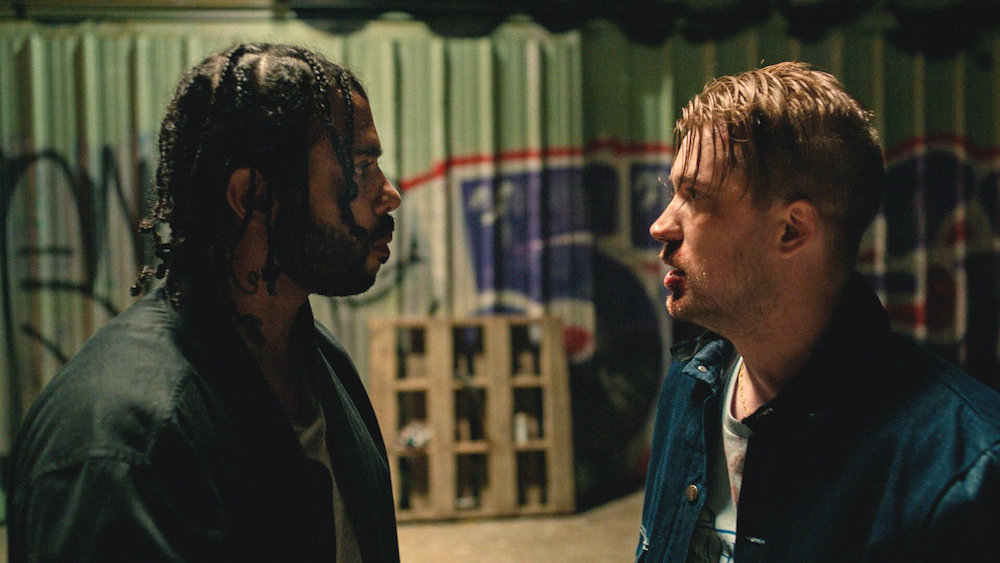
16 Aug Blindspotting’ Shows an Often-Missed Reality

Movie Review, Keisa Reynolds
The Bay Area has changed beyond recognition.
It’s evident in the new businesses and exclusive condominiums, but it becomes even more apparent when a 20-something takes his sweet time unloading Whole Foods bags from his car. He’s on his phone and uses one hand to take out each bag, one by one, with no regard for the blaring horn from the moving truck parked in behind his car. He barely glances at the truck’s passengers. He, for some strange reason, feels entitled to amount of space he is taking and the inconvenience he is causing others. This is his Bay Area.
This is just one of many scenes that plays out in the hit film, Blindspotting.
Starring and co-produced by Oakland-born actors and rappers Daveed Diggs (Hamilton and Blackish) and Rafael Casal, no movie has captured Oakland better than this film.
Blindspotting doesn’t take place in the Oakland of 40 years ago. It’s in the Oakland most familiar to children of former Black Panthers and other political activists who dreamed of, and fought for, change, whether or not it came out of a revolution. These children are 25, 30, 35 years old, and they are realizing their living history is being erased.
We are, by definition, millennials, a demographic that came of age in the era of social media and the gig economy. We have to grapple with the fact that we benefit from it in many ways. It started with the infusion and invasion of companies like Apple, Uber and Twitter. These companies brought us some of the best technological advancements, and to an extent, it all came at the expense of our own backyards.
Blindspotting reminds us of the cultural implications of gentrification: communities we hold near and dear are slowly being erased. These places and people tell us so much about ourselves, we begin to question who we are without them. The streets become unfamiliar, as do the neighborhood spots like Kwik Way, and eventually, the people, too.
Diggs and Casal’s characters work as movers hired to relocate the belongings of long-time Oakland residents, many of whom can’t afford rising rents, who miss having a neighborhood that feels like home.
No matter how much gentrification changes Oakland and other parts of the Bay Area, the system remains the same.
Diggs plays Collin, who is living out his last three days on probation. He spends most of his time trying to keep his head down. He is aware of the precarious nature of being a Black man in Oakland, especially one with a criminal record. Casal plays Miles, Collin’s rambunctious best friend since childhood. The pair are tight, and they both represent the Oakland they grew up with, but their personalities and lived experiences highlight many differences between them.
Mac Dre and ghost riding aside, this is a true Oakland film when it brings up a topic that is rarely brought up when discussing the Bay Area’s melting pot: white privilege.
Miles is a white man raised in Oakland, and everyone in his immediate life is Black: his girlfriend, son, and best friend Collin. There is nothing inauthentic about Miles, not the way he dresses or speaks or loves the people whose skin differs from his. However, Miles has to reconcile how he is viewed in Oakland when there is an influx of white young people in neighborhoods they avoided for decades. He isn’t one of them, but he could easily fit in. His white privilege was always evident in his friendship with Collin, a Black man sentenced to jail and a year’s probation for the same incident involving Collin.
Blindspotting provides its audience a nuanced perspective of white privilege and the intimacy of interracial relationships, both romantic and platonic.
The film might distort some outsiders’ perception of Oakland as a progressive place where folks of all ethnicities can congregate in appreciation of art and politics. That isn’t untrue for the city, but there is more beyond the surface. There is tension bubbling inside many longtime residents who are losing their sense of identity, their friends and family.
Nearly all of the intense scenes are followed by much-needed comedic relief, a style of which I now realize is characteristic to East Bay. There is nothing funny about police shootings, the prison industrial complex or gentrification, but Blindspotting provides moments to laugh at the absurdity of life.
I watched Blindspotting in a rapidly gentrifying neighborhood of Chicago, my home of seven years. Nearly 1,500 miles away from my own beloved Richmond, I left the theatre awed and inspired. How do we hold onto the places that birthed us? How do we pay our dues and try our hardest to survive?
I don’t know have the answers, but Blindspotting provides guidance I didn’t realize was necessary. Bravo, Casal and Diggs.
Blindspotting is showing at select theaters across the country, including Century Richmond Hilltop 16, Landmark California Theatres in Berkeley, and most other theaters in the Bay Area.






No Comments